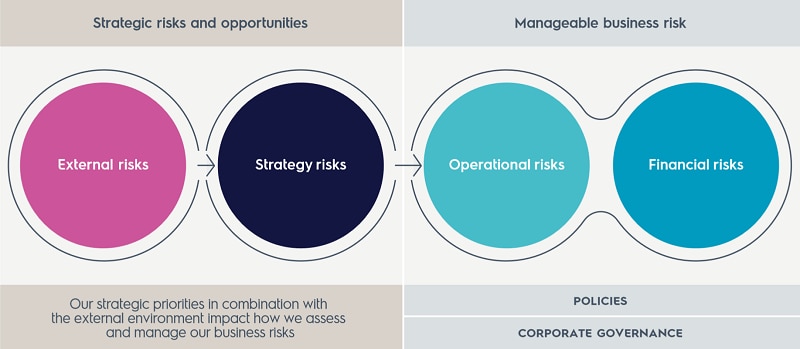Active risk management is essential for Electrolux to drive successful operations. The Group’s strategic framework in combination with the external environment generates opportunities but also risks which in turn impact how the company manages those risks in the daily operations. Electrolux monitors and minimizes key risks in a structured and proactive manner.

In general, there are two types of risks: Strategy risks and Manageable business risks. The strategy risks are related to the Group’s strategy and are impacted by the external environment. The business risks comprise of operational and financial risks which are managed by the Group’s operational units and Group Treasury, respectively. The Group has several processes to manage risks through operational activities that are performed by the business area boards. The Group has also established internal bodies that manage risk exposures on a regular basis. Example of internal bodies are: Risk Management Board, Insider Committee, Ethics & Human Rights Steering Group, Audit Board and the Tax Board. For more information on Electrolux organizational structure and system for internal control and risk management see the Corporate Governance report.
EXTERNAL RISK: Macroeconomic trends, political uncertainties and overall changes in industry dynamics are factors that may impact the appliance industry. The Electrolux board and the business area boards monitor the development in the key markets and proactively assess macroeconomic and political risks but also opportunities that may influence the Group’s strategy and operations in those markets.
STRATEGY RISK: The Group strategy is affected by both external and internal factors which may create a risk in the execution of the strategy. The Electrolux board and the business area boards continuously revise the strategic framework to ensure it is up to date. The Groups operational units are managing potential execution risks related to the strategic priorities.
OPERATIONAL RISK: The Group’s ability to improve operational performance and create value for its stakeholders is linked to achieving fast consumer innovation, product portfolio management, strong brands and cost efficient operations. Realizing this potential requires effective and controlled risk management. The Group has internal bodies that proactively monitors and manages operational risks.
FINANCIAL RISK: Electrolux is impacted by financial risks such as capital market risk, credit risk and liquidity risk. These are regulated in accordance with the Group’s Financial Policy that has been adopted by the Electrolux Board of Directors. Management of these risks is centralized to Group Treasury and is mainly based on financial instruments.
The Annual Report for AB Electrolux (publ) 556009-4178, consists of the Report by the
Board of Directors, Notes, Proposed distribution of earnings and Auditors´ report.